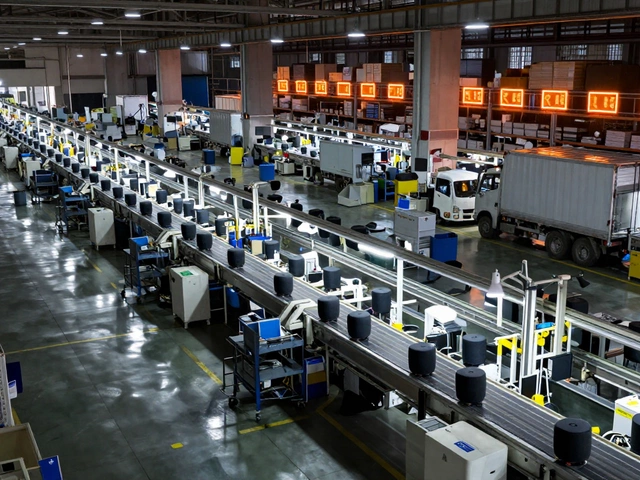Launching a Manufacturing Business from Scratch: A Beginner's Guide

Diving into the manufacturing world without any experience may sound intimidating, but it's not an impossible feat. When you have the right guidance and resources, it can turn into a rewarding journey. The path starts with identifying a product niche that aligns with current market demands, your skills, and passions.
Setting a solid plan and conducting market research are crucial steps that will set the stage for success. You'll find that effective use of technology can optimize efficiency and streamline your operations significantly.
Creating a network of reliable suppliers is necessary for maintaining supply chains and meeting production deadlines. Keeping a close eye on production costs will ensure that your business remains viable and competitive. Understanding legal obligations and ensuring compliance will protect your business and help it grow safely within the industry.
- Recognizing the Right Product Niche
- Planning and Research
- Leveraging Technology for Efficiency
- Building a Reliable Supplier Network
- Managing Production Costs
- Legal and Compliance Considerations
Recognizing the Right Product Niche
Finding the perfect product niche is crucial when you're about to embark on a manufacturing venture with no prior experience. Identifying a sweet spot that balances personal passion, market demand, and profitability is the golden ticket to success. Start by evaluating your interests and skills. They often provide insightful indicators of industries and products you might be naturally inclined toward or understand well. Delving into areas that excite you can add an intrinsic motivation to your work, enhancing your chances of building a successful enterprise.
Research is, without a doubt, a cornerstone of uncovering a viable niche. Utilize market research tools and platforms to analyze current trends and consumer behavior. Look for gaps in the market where demand is robust, but supply is limited or non-existent. These gaps present lucrative opportunities for new businesses to enter and establish a foothold before competitors. Tailor your research to gauge both current and future trends. Anticipating shifts in consumer preferences can position your business ahead of friends and foes alike. Remember, being a trailblazer in an up-and-coming niche can often turn into a competitive advantage.
Understanding your potential competitors is equally important. Investigate what they offer, their pricing structures, and customer feedback. This strategic intel not only helps identify the uniqueness your product can have but also exposes potential flaws or lapses you might exploit. For a deeper understanding, Larry Kim, a respected leader in the business strategy field, once said, "Understand the market and understand your competition, then do it better."
This approach can inform your business model and refine your offering to appeal directly to your target audience.
Moreover, don't shy away from reaching out to potential customers even before you launch. Conduct surveys or focus groups to gather valuable feedback, adding a layer of assurance that your product will actually meet the demand. Sometimes, using this approach helps in modifying or even fine-tuning your initial product ideas based on real-world insights that are closer to real consumer expectations. Entrepreneur magazine states that over 80% of consumers say they prioritize businesses that actively want and use their feedback.
Finally, look for inspiration in successful case studies of companies that started with minimal experience but recognized the right time and product to enter the market. Learning from others' journeys can provide valuable lessons and sometimes a guideline for your path forward. Dive into strategic planning with passion, patience, and persistence.
Planning and Research
Embarking on the journey to start a manufacturing business demands meticulous planning and thorough research. These are the keystones to building a strong business foundation. The initial phase revolves around understanding the landscape of the manufacturing industry, beginning with market analysis. Identifying a demand for your product is crucial. Dive into detailed market research to pinpoint who your potential customers are, what they currently need, and what gaps exist in the industry. This phase is particularly important as it allows you to carve out a unique niche that aligns both with market demands and your passion. You want to find that sweet spot that not only excites you but also has a viable target market.
Building a comprehensive business plan is the next step. This document not only outlines your mission and vision but also sets the roadmap for achieving your goals. Include sections on marketing strategies, financial projections, and risk management. It serves not only as a guide but also as a tool to secure funding from investors. A well-crafted plan demonstrates your commitment and foresight to potential stakeholders.
Financial planning, another critical component, involves forecasting revenue, expenses, and profits. Having a clear picture of your financial trajectory is essential. Seek advice from seasoned professionals or mentors who have successfully navigated the waters of startup challenges. Many entrepreneurs find that attending workshops or enrolling in online courses can enhance their understanding of manufacturing processes and business management. A quote from Harvard Business Review says,
"Investing time in learning and development can make the difference between a shaky start and a successful launch."
In today's world, competitive advantage can often be gained by incorporating technology into your business startup. Research the technological tools that can optimize your production processes or offer better customer insights. Innovative software solutions are available for nearly every business function, from inventory management to customer relationship management systems, each designed to enhance efficiency and productivity.
You should also take into account the initial capital investment required. Begin by calculating costs associated with machinery, workforce, raw materials, and other operational expenses. To give you a clearer picture, here’s a simple breakdown of common startup costs in the manufacturing sector:
| Expense Type | Estimated Cost (USD) |
|---|---|
| Machinery and Equipment | 10,000 - 100,000 |
| Initial Inventory | 5,000 - 20,000 |
| Rent and Utilities | 3,000 - 10,000 |
| Licensing and Permits | 500 - 2,000 |
Last but not least, research regulations and compliance requirements pertinent to your specific manufacturing business. Each industry has its unique set of legal landscapes you need to navigate. Consulting with legal professionals or utilizing online resources from government sites can help ensure that your business remains compliant, which is non-negotiable when aiming for long-term success.

Leveraging Technology for Efficiency
Technology has become the backbone of modern manufacturing, driving efficiency and innovation across various processes. When you start a manufacturing business, embracing the right technology is not just advantageous—it's essential. The first step is to assess your production line and identify areas where technology can enhance productivity. Automated machinery, for instance, can replace labor-intensive processes, reducing labor costs and minimizing human errors. Incorporating technology that automates repetitive tasks allows your team to focus on more complex activities, which in turn maximizes output and improves quality.
Utilizing software solutions, such as Enterprise Resource Planning (ERP) systems, can significantly streamline operations. These tools integrate various business processes, from inventory management to human resources, enabling you to maintain a bird's-eye view of your operations. An ERP system ensures that every sector of your business communicates efficiently, helping you make informed decisions with real-time data. As noted by the manufacturing sector expert, John Smith, "Integrating technology into your operations can transform your manufacturing process, unlocking opportunities you never knew existed." His insight underscores the importance of tech adoption in today's manufacturing landscape.
In addition to machinery and software, embracing smart technology like the Internet of Things (IoT) can revolutionize your manufacturing startup. IoT devices can track equipment performance in real-time, sending alerts about maintenance needs before downtime occurs. This proactive approach reduces unexpected disruptions, which can save you both time and money. Furthermore, digitizing your supply chain with IoT solutions can offer improved visibility, making it easier to adapt to changes in demand or supply disruptions. Aligning your business strategy with technological advancements can give you a competitive edge by optimizing efficiency and enhancing your production capabilities.
Benefits of Implementing Advanced Technology
Leveraging technology enables seamless integration across production stages, ensuring that each part of your operation functions in harmony. For instance, additive manufacturing, commonly known as 3D printing, provides a flexible way to create prototypes without the exorbitant costs associated with traditional manufacturing methods. It also allows for quick iterations and improvements, enhancing innovation within product development cycles. Moreover, cloud computing offers scalable resources and robust storage solutions without the heavy upfront capital associated with physical infrastructure. These cloud-based systems facilitate easy access to your valuable data from anywhere, fostering collaboration and enhancing decision-making across your team.An essential aspect of embracing technology within your manufacturing business is understanding the potential return on investment (ROI). The initial costs of technology adoption can be steep, but the long-term benefits typically outweigh these expenditures. Efficiently used technology reduces waste, improves quality, and speeds up time to market, translating to noticeable gains. According to a study by the International Data Corporation, companies that invested in advanced technologies experienced a 30% reduction in material waste and a 25% increase in production output. Subsequently, this translates into improved profit margins and customer satisfaction, supporting the business's overall growth. As these examples demonstrate, investing in technology is a strategic move that future-proofs your manufacturing business against the rapidly changing market dynamics.
Building a Reliable Supplier Network
Creating a strong supplier network is like building the backbone of your manufacturing business. The quality of your suppliers can directly influence the quality of your final product, and having reliable partners can make or break your business efficiency. Start by researching potential suppliers and categorizing them based on the quality of products, cost-effectiveness, and reliability. Establishing a good relationship with your suppliers involves clear communication, setting expectations, and negotiating terms that are beneficial for both parties. One effective approach is to diversify your supplier base to avoid dependency on a single source, which may threaten production if disruptions occur.
When it comes to evaluating suppliers, visiting their production sites can provide valuable insights into their operations, quality control measures, and compliance with safety standards. This not only helps in assessing their capability but can also build a stronger rapport with them. Ensuring that your suppliers are well-versed with the legal and environmental regulations of the industry is crucial; non-compliance can lead to product recalls, legal issues, or worse. Traceability is another important aspect, especially when it comes to raw materials, as it can affect the product’s safety and market acceptance.
To solidify your network, use technology such as supply chain management software, which provides a holistic view of your supplier interactions and streamlines the ordering process. Creating mutually beneficial relationships is key. For instance, by providing longer contracts, you can often secure better prices and priority service during peak demand times. As Richard Branson famously said,
"Succeeding in business is all about making connections."This is particularly true when dealing with suppliers, as strong relationships can lead to better service and unforeseen business opportunities.
Strong negotiation skills are also pivotal in forming agreements that protect the interests of both parties involved. Always consider having a backup plan or an auxiliary network of suppliers in case your primary network faces unforeseen challenges. This could involve engaging with local suppliers as an operational safety net. Lastly, keep in mind that your network should evolve with your business. As your production scales, reassess and adapt your supply strategies to stay aligned with your business growth. This kind of proactive management not only benefits your supply chain but also enhances your business's resilience and adaptability in the dynamic market environment.

Managing Production Costs
Effectively managing production costs is pivotal for any new manufacturing business aiming to stay competitive and profitable. The cost of production encompasses everything from raw materials and labor to overhead costs and utilities. It's crucial to have a clear understanding of where every dollar is going. Initially, start with an exhaustive breakdown of your potential expenses. Itemize material costs, estimate labor wages, and take into account the cost of equipment and maintenance. Notably, raw materials often represent the largest percentage of production costs, so negotiating favorable terms with your suppliers can have a significant impact.
Streamlining your manufacturing process is a game-changer when it comes to cost management. Implementing lean manufacturing principles can dramatically reduce waste and enhance efficiency. Techniques like Just-in-Time (JIT) manufacturing can help maintain minimal inventory levels, which reduces waste and cuts storage costs. Additionally, it's wise to invest in modern technology and automation. These investments might seem costly upfront, but they often result in long-term savings by boosting productivity and reducing human error.
Monitoring expenses consistently is essential. Create a detailed financial dashboard that tracks costs in real-time and flags any variances from expected costs. Integrated software systems can automate this process, providing insights that allow you to make quick and informed adjustments. Always be on the lookout for hidden costs and be prepared to cut corners where possible without compromising product quality. Implementing a robust Quality Control process is another essential component in managing production costs efficiently.
"Efficiency is doing things right; effectiveness is doing the right things." - Peter Drucker
Outsourcing certain production elements can be an effective way to manage costs, particularly when you scale operations. Consider hiring freelancers or third-party companies for specialized tasks that are not part of your core activities. This allows you to focus on your strengths while optimizing cost efficiency. Conduct a cost-benefit analysis regularly to decide whether certain processes should stay in-house or be outsourced.
Technology and Cost Reduction
Technology plays a significant role in managing production costs. By adopting cutting-edge solutions like AI for predictive maintenance, businesses can prevent equipment downtime. This kind of proactive approach not only ensures continuous production but also reduces repair costs. Evaluating and choosing the right enterprise resource planning (ERP) system can provide comprehensive oversight, which in turn aids in making data-driven decisions. Additionally, most modern ERP systems come equipped with tools to help forecast demand, optimize inventory levels, and keep track of real-time production costs, making them indispensable for reducing expenses.
Lastly, remember that managing costs does not mean you should compromise on the quality of your products. Finding a balance is key, ensuring that your business remains viable while still delivering exceptional value to your customers. Keep revisiting and revising your cost management strategies to align with the changing market dynamics and technological advancements in the sector.
With careful planning, investment in technology, and ongoing evaluation, managing production costs can provide a solid foundation for a successful and sustainable manufacturing business startup.
Legal and Compliance Considerations
Jumping into the world of manufacturing involves more than just creating a product and selling it. There are several legal and compliance matters that need your attention before opening your doors. Firstly, ensure that your business is legally registered. Registering your manufacturing business is fundamental; it not only legitimizes your operations regionally but also shields your interests and rights as a business owner. You'll need to decide on a business structure that best fits your needs, whether it's a sole proprietorship, partnership, or corporation.
Secondly, obtaining the necessary licenses and permits is crucial. In many cases, specific manufacturing business activities are subject to both local and national regulations, which might require different permits or approvals. Research what specific licenses you'll need in your area, as they can vary significantly from place to place, depending on what you're manufacturing. This step can often be overlooked, yet it's critical to ensuring your operations run smoothly and lawfully from day one.
"Compliance isn't just a burden; it's an essential part of doing business that builds operational integrity." — Former Secretary of Commerce
Product safety is another important aspect. Every product you manufacture must comply with safety standards set by regulatory bodies. This ensures that your goods are safe for consumer use, preventing any legal issues that could arise from harmful or faulty products. It's important to stay updated on the safety standards pertaining to your industry, as these can influence product design, manufacturing processes, and final distribution.
Employment law is also a key consideration. As your business grows and you start hiring, you must comply with labor laws and regulations. This includes ensuring fair wages, maintaining appropriate working conditions, adhering to working hour policies, and ensuring health and safety standards are met. Fostering a lawful and supportive workplace not only keeps you in line with the law but also boosts employee morale and productivity.
Environmental regulations should not be neglected, especially given today's focus on sustainability. Many countries have strict regulations on waste disposal, emissions, and resource usage. Understanding and adhering to these regulations not only prevents legal repercussions but also contributes to a positive brand image which is crucial in the modern marketplace. Consider investing in sustainable practices, which can distinguish your brand and align with consumer values.
Tackling tax obligations is another crucial step. Understanding the taxes applicable to your manufacturing business—be it sales, income, or payroll taxes—ensures you fulfill obligations without unpleasant surprises, such as fines for non-compliance. Consult with a tax professional early in your business journey to map out a plan for tax compliance.
Staying Informed and Updated
Laws and regulations are not static; they evolve. Hence, keeping up-to-date with legal changes in the manufacturing industry is pivotal. Joining industry associations can be beneficial as they often provide the latest information and resources to help businesses navigate legal landscapes. Furthermore, consider appointing a compliance officer or consulting a legal expert if your business scales up. This approach not only keeps you compliant but also guards your business startup against legal pitfalls.





